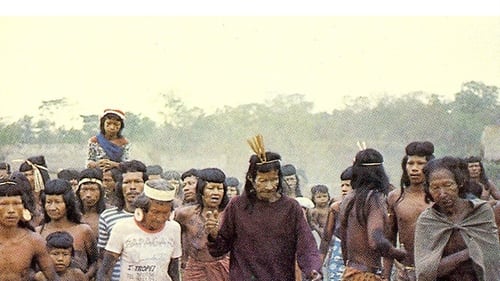
Andrea Tonacci
Nacimiento : 1944-01-01, Rome, Italy
Muerte : 2016-06-16
Historia
Andrea Tonacci (Rome, 1944 - São Paulo, 2016) was an Italian-Brazilian filmmaker, considered one of the main figures of the Cinema Marginal movement of underground filmmaking in 1970s Brazil. He moved with his parents to São Paulo when he was 11 years-old. A few years later, he studied Architecture and Engineering at the Presbiterian University of Mackenzie, but dropped both careers to purchase his dream of becoming a filmmaker. His first feature-lenght film, "Bang-Bang" (1971), was recieved with mixed opinions by the Cinema Marginal movement and was screened at the Director's Fortnight at the Cannes Festival.
In 2006, his film "Serras da Desordem" got him the Kikitos for best photography, best picture and best director at the Gramado Festival of Brazilian Cinema.
In 2010, he was given the Order of Cultural Merit, highest honor of the Brazilian Government to personalities who contribute to the development of Brazilian identity and culture.
He passed away in December 16, 2016, a victim of pancreatic cancer.

To start again. one has to destroy.

Writer
A dialogue between the auteur's memories and the images he shot and kept during his long film career - sketches of live that were never shown, never seen, never edited.

A dialogue between the auteur's memories and the images he shot and kept during his long film career - sketches of live that were never shown, never seen, never edited.

Director
A dialogue between the auteur's memories and the images he shot and kept during his long film career - sketches of live that were never shown, never seen, never edited.

Himself (archive footage)

Director
A documentary about the permanence of brazilian native rituals in nomadic and rural communities among the pervading capitalism.

Producer
Tras sobrevivir a una masacre que exterminó a su poblado, Carapirú, un indio Awa Guajá, huye y pasa diez años deambulando por las regiones más aisladas de Brasil. En noviembre de 1988, a 2.000 kilómetros de la selva de la que tuvo que escapar, un antropólogo experto en el mundo indígena lo descubre y lo arrastra a Brasilia, donde Carapirú se convierte en un fenómeno mediático. Disolviendo los límites entre realidad y ficción, y con un sentido del humor y una libertad cercana al libertinaje formal, Serras da desordem reconstruye el viaje inicial de Carapirú, y retrata a través de su historia la tragedia de una cultura violada en aras de un progreso inventado y brutal.

Writer
Tras sobrevivir a una masacre que exterminó a su poblado, Carapirú, un indio Awa Guajá, huye y pasa diez años deambulando por las regiones más aisladas de Brasil. En noviembre de 1988, a 2.000 kilómetros de la selva de la que tuvo que escapar, un antropólogo experto en el mundo indígena lo descubre y lo arrastra a Brasilia, donde Carapirú se convierte en un fenómeno mediático. Disolviendo los límites entre realidad y ficción, y con un sentido del humor y una libertad cercana al libertinaje formal, Serras da desordem reconstruye el viaje inicial de Carapirú, y retrata a través de su historia la tragedia de una cultura violada en aras de un progreso inventado y brutal.

Director
Tras sobrevivir a una masacre que exterminó a su poblado, Carapirú, un indio Awa Guajá, huye y pasa diez años deambulando por las regiones más aisladas de Brasil. En noviembre de 1988, a 2.000 kilómetros de la selva de la que tuvo que escapar, un antropólogo experto en el mundo indígena lo descubre y lo arrastra a Brasilia, donde Carapirú se convierte en un fenómeno mediático. Disolviendo los límites entre realidad y ficción, y con un sentido del humor y una libertad cercana al libertinaje formal, Serras da desordem reconstruye el viaje inicial de Carapirú, y retrata a través de su historia la tragedia de una cultura violada en aras de un progreso inventado y brutal.

Director
By Ministry of Culture.

Cinematography
A documentary on the Canela Apãniekra (Timbira) community in Brazil. Showing their daily habits, political struggle, oral tradition and the formation of space in Barra do Corda, Maranhão.

Director
Documentation of the preparations and expeditions of the Frente de Atração Arara da Funai, in the state of Pará, Brazil. With the construction of the Transamazônica, the Arara territory (without contact with the white man) is cut in half, and the Indians react by attacking the workers. Aware that all contact is a creation of dependency, the sertanista Sydney Possuelo, who also reflexively narrates the documentary, leads the expeditions that aim to identify the groups, how many individuals there are, establishing territorial limits to protect the area against invaders and loggers in the region.

Director
A documentary on the Canela Apãniekra (Timbira) community in Brazil. Showing their daily habits, political struggle, oral tradition and the formation of space in Barra do Corda, Maranhão.

Director
A film that records the rehearsals of a Brazilian theatre troupe directed by Victor Garcia, and then the conflicts that break out as they tour Iran and France with a performance of Calderon's autos sacramentales. A problem with a scenery prop sparks a crisis in the group and the film chronicles this disaster.

Executive Producer
An anonymous urban protagonist experiences a series of absurd situations--including a crazy cab ride, an encounter with a wacky criminal gang, and lots of gunplay--infused with a unique anarchic energy, eventually suggesting our true animal nature.

Writer
An anonymous urban protagonist experiences a series of absurd situations--including a crazy cab ride, an encounter with a wacky criminal gang, and lots of gunplay--infused with a unique anarchic energy, eventually suggesting our true animal nature.

Director
An anonymous urban protagonist experiences a series of absurd situations--including a crazy cab ride, an encounter with a wacky criminal gang, and lots of gunplay--infused with a unique anarchic energy, eventually suggesting our true animal nature.

Art Direction
Ângela Carne e Osso (Angela Meat and Bone), a young nymphomaniac, lives surrounded by delinquents, and exerts intense allure on them, dominating them all with her erotic power.

Cinematography
Religious beliefs linked to football.

Producer
Religious beliefs linked to football.

Production Design
La historia de un famoso criminal brasileño, llamado The Red Light Bandit porque siempre usaba una linterna roja para irrumpir en las casas durante la noche. Trabajando solo, también solía violar a sus víctimas femeninas.

Producer
The tensions experienced by three different people during the military dictatorship in Brazil: a politician, a revolutionary and a common citizen.

Writer
The tensions experienced by three different people during the military dictatorship in Brazil: a politician, a revolutionary and a common citizen.

Director
The tensions experienced by three different people during the military dictatorship in Brazil: a politician, a revolutionary and a common citizen.

Director of Photography
A group of middle-class friends driving around São Paulo choose one of the women as a bait to attract a victim, object of their alienation and moral aggressiveness.

Writer
A group of middle-class friends driving around São Paulo choose one of the women as a bait to attract a victim, object of their alienation and moral aggressiveness.

Director
A group of middle-class friends driving around São Paulo choose one of the women as a bait to attract a victim, object of their alienation and moral aggressiveness.

Director of Photography
Two young men decide to go to the cinema. However, since their tastes are very strict, they end up in a quarrel.







